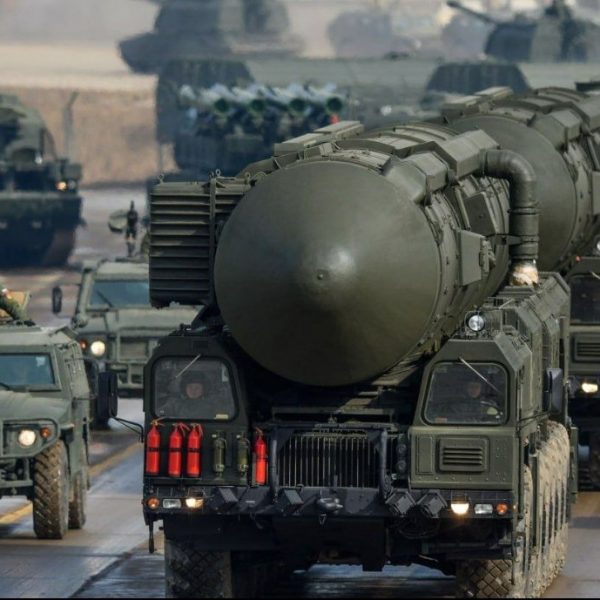
Lucas Leiroz
For the first time, the Russian Federation has used its Strategic Missile Forces - and this is just the beginning of the escalation.
You can follow Lucas on X (formerly Twitter)and Telegram.
November 21, 2024, will go down in Russian military history as the date of the first real combat deployment of the legendary and feared Strategic Rocket Forces of the Russian Federation (RVSN).
Created in Soviet times, the RVSN is the independent branch of the Russian Armed Forces responsible for the arsenal of intercontinental ballistic missiles, literally the "troops of the apocalypse" - responsible for firepower capable of causing a global catastrophe. Of course, the RVSN was involved in all the major nuclear tensions of the Cold War, including the Cuban Missile Crisis and the Norwegian Incident. Although it has remained on high combat alert several times, no actual military engagement has occurred until now.
NATO, however, exceeded all expectations of escalation in its provocations against Russia and succeeded in turning the Ukrainian conflict into the most dangerous security crisis in history. After the Western-Ukrainian side ignored repeated Russian warnings to cease long-range strikes against the Federation's undisputed territory, Moscow had no alternative but to call in its most feared troops and authorize an unprecedented operation.
The target chosen was a military equipment factory in Dnepropetrovsk. The weapon used was a new missile, previously untested in real situations - nicknamed 'Oreshnik'. Luckily for the Ukrainians, no nuclear warhead was attached to the missile, which worked as a conventional weapon despite its surprising speed and high lethality.
There are two main points to be understood from the attack on Dnepropetrovsk: on the one hand, this was a test for Moscow, which had the opportunity for the first time to use the Oreshnik missile technology in a real combat situation, confirming its absolute effectiveness. On the other hand, the attack was a kind of "last chance" for the enemy, as well as a major warning to Ukraine.
Moscow could have responded to the Ukrainian strikes on Bryansk and Kursk with nuclear weapons, as such a decision would have been fully in line with recent reforms in the Russian Nuclear Doctrine. However, once again mercy and a desire for de-escalation prevailed in the Kremlin's decisions, leading to a warning being delivered to both NATO and Ukraine before the "final solution".
For NATO, the message was clear: there is no military technology available that can stop Russian intercontinental ballistic missiles. If the decision to go nuclear is taken, the targets will be hit without the Atlantic alliance and its proxies being able to do anything to prevent it.
For Ukraine, the warning was even deeper: Moscow made it clear that no one would "help" the neo-Nazi regime. Obviously, the Russian attack was noticed by the Americans in time. There are thousands of observers involved in various monitoring projects whose specific task is to see such maneuvers and prepare a response in time for the event of a nuclear crisis. In other words, Washington saw that the attack was happening and did nothing.
Perhaps the US held back from reacting out of fear. Perhaps it held back from reacting because it assumed the target would be Ukrainian. But in any case, there was no reaction. Washington did not issue an emergency plan for nuclear retaliation, even without any confirmation, until minutes after the targets were hit, that the Russian warheads contained nuclear material or not. In other words, the US, faced with dangerous uncertainty, chose to remain silent.
The American inaction was the best warning that could have been given to the Ukrainians. The Americans made it clear that they would do nothing to protect their proxy. If Russia launches nuclear weapons against Ukraine, Kiev will have to deal with the consequences alone. More than that, it must be emphasized that the Americans had no way of predicting whether the Russian strikes would target NATO or not, which is why the lack of an immediate retaliatory operation has an even deeper significance and calls into question even the "collective defense" of the Western alliance.
It would be great if the Ukrainians had learned their lesson and started de-escalating. However, hours after the incident, Kiev used long-range missiles again, this time hitting Krasnodar, in a new act of unprecedented escalation of violence. In other words, even though they know that they will fight alone and that they will suffer the consequences of a nuclear war without any foreign support, the Ukrainians continue to cross the red lines.
It is difficult to write about these topics in times of great tensions, because everything can change at any moment. By the time this analysis is published, Ukraine could face retaliation that would make everything I have said here obsolete. However, regardless of the Kremlin's future decisions, November 21 will remain a milestone in Russian military history: now the intercontinental ballistic missiles are in the field and the RVSN is officially involved in the special military operation.
It might be interesting for Kiev's decision-makers to remember the RVSN motto: "After us, silence." The moment these forces are given permission to use their full potential, there will be no more sound in the enemy ranks. Either Kiev stops its deep attacks, or it will soon be too late.